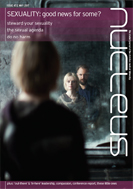Sexuality. A topic best avoided? Not discussed in polite society? But so fundamental to the lives ofChristians and others alike.
This hasn't been the easiest edition of Nucleus to put together. Much has been said and written on this subject. Some has been of great value. But we've almost all read less helpful material about sexuality as well - articles that are too black and white, or books that are so vague and grey as to be unclear.
'Gut instinct' morality often trumps careful thought. The psychology behind this is as applicable to Christians as anyone else, and means that our reactions to sexual ethics that differ from our own are sometimes confrontational and condemning. People outside the church have come to hold quite clear impressions of how Christians view sex andsexuality. Though not always accurate, such impressions are understandable, and are now often a bigger barrier to a conversation about faith than more traditional objections such as the reliability of the Bible.
One thing that is helpful when writing or speaking about this topic is to think about how it will come across to your friends. What about the same-sex couple you know who married last year? Or the lady in church struggling to bring up two toddlers after a divorce? Or the young Christian couple who are expecting a baby having planned to marry next year? Are we being gentle and respectful in how we communicate?
While fear of giving offence may be helpful in ensuring that we strike an appropriate tone, it can also completely silence us. Christian sexual ethics are clearly at odds with those of the society around us. Christians are seen not just as wrong, but as backwards and even oppressive. It is not surprising that saying nothing at all has become the apparentlysafe route.
But if we say nothing, we don't start on neutral ground. Most people already think they know what a Christian view of sexuality is, and they don't like it. This view prevails, rather than a 'neutral' standpoint, if we are silent. So we need to make sure that our story is heard.
It won't always be popular, of course. Challenging the unbridled autonomy and self-centredness of today's sexual culture strikes at the core of what many people have been led to believe is central to their identity. It is not surprising that there will be significant resistance.
But we should make sure it is the real story that we tell. Not a story of moral rules, nor a story that says 'no' loudly and stops there. God gave sexuality not for its own sake, but that it might point to the union between Christ and the church in God's kingdom. Sex is not all there is - it is a pointer to something very much better, and to our place in the greatest of stories.
Our challenge today is to tell this story with gentleness and respect, giving an account for the hope we have as we do so. We pray that this edition of Nucleus will be a tool that helps you to do that.
This hasn't been the easiest edition of Nucleus to put together. Much has been said and written on this subject. Some has been of great value. But we've almost all read less helpful material about sexuality as well - articles that are too black and white, or books that are so vague and grey as to be unclear.
'Gut instinct' morality often trumps careful thought. The psychology behind this is as applicable to Christians as anyone else, and means that our reactions to sexual ethics that differ from our own are sometimes confrontational and condemning. People outside the church have come to hold quite clear impressions of how Christians view sex andsexuality. Though not always accurate, such impressions are understandable, and are now often a bigger barrier to a conversation about faith than more traditional objections such as the reliability of the Bible.
One thing that is helpful when writing or speaking about this topic is to think about how it will come across to your friends. What about the same-sex couple you know who married last year? Or the lady in church struggling to bring up two toddlers after a divorce? Or the young Christian couple who are expecting a baby having planned to marry next year? Are we being gentle and respectful in how we communicate?
While fear of giving offence may be helpful in ensuring that we strike an appropriate tone, it can also completely silence us. Christian sexual ethics are clearly at odds with those of the society around us. Christians are seen not just as wrong, but as backwards and even oppressive. It is not surprising that saying nothing at all has become the apparentlysafe route.
But if we say nothing, we don't start on neutral ground. Most people already think they know what a Christian view of sexuality is, and they don't like it. This view prevails, rather than a 'neutral' standpoint, if we are silent. So we need to make sure that our story is heard.
It won't always be popular, of course. Challenging the unbridled autonomy and self-centredness of today's sexual culture strikes at the core of what many people have been led to believe is central to their identity. It is not surprising that there will be significant resistance.
But we should make sure it is the real story that we tell. Not a story of moral rules, nor a story that says 'no' loudly and stops there. God gave sexuality not for its own sake, but that it might point to the union between Christ and the church in God's kingdom. Sex is not all there is - it is a pointer to something very much better, and to our place in the greatest of stories.
Our challenge today is to tell this story with gentleness and respect, giving an account for the hope we have as we do so. We pray that this edition of Nucleus will be a tool that helps you to do that.
































